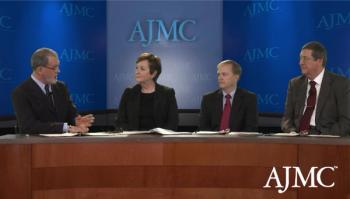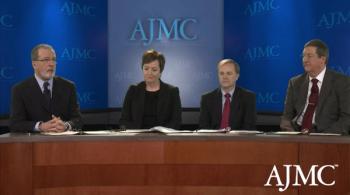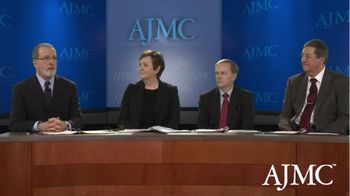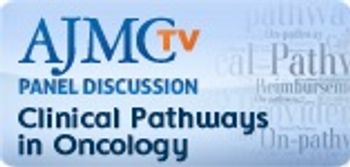
Can care delivery and payment reform in healthcare help tide us over the existing gaps in cancer care?

Can care delivery and payment reform in healthcare help tide us over the existing gaps in cancer care?

How can care providers ensure cancer survivors continue to receive adequate follow-up care post treatment?

How can discussions on advance care planning and end-of-life care be successfully broached with patients and their family members?

Panelists discussed how patient-centered care can be valuated in the changing healthcare climate.

Is there anything like an ideal patient portal that can cater to a broad range of patients? According to Rebekkah Schear, MIA, what patient portals lack is a holistic approach toward the patient.

How can we create more standardized health information platforms that can easily exchange patient information?

Cancer is a complex disease to treat an patients can be overwhelmed by the number of care providers that they have to consult with. In this scenario, care navigators can provide significant support to patients and their family members.

Panelists discuss the need for documenting a treatment plan early in patient care.

Joseph Alvarnas, MD, editor-in-chief of Evidence-Based-OncologyTM spoke with Rebekkah Schear, MIA, and Michael Kolodziej, MD, to discuss the progress and challenges in oncology care.

Jennifer Malin, MD, staff vice president, Clinical Strategy, Anthem, said that while there are a lot of quality measures being developed by several organizations, care gaps persist.

When comparing a private practice with a larger healthcare system, Linda Bosserman, MD, assistant clinical professor and staff physician, City of Hope, said that the challenges can run across the system.

Jennifer Malin, MD, staff vice president, Clinical Strategy, Anthem, spoke about her health plan’s requirements on quality measures and whether they resonate what CMS requires providers to submit.

Measuring quality is important in determining whether patients are getting the appropriate care they need, and according to Linda Bosserman, MD, assistant clinical professor and staff physician, City of Hope, quality measures should cater to the patient’s unique needs.

From a health plan perspective, the key to effectively using electronic health records, or EHRs, is to leverage the infrastructure in a manner that takes the burden away from the physician and his or her practice, said Jennifer Malin, MD, staff vice president, Clinical Strategy, Anthem.

Data interoperability remains a challenge among practicing physicians and health plans, mainly because each system operates on its own standards and vocabulary, explained Jason C. Goldwater, MA, MPA, senior director, National Quality Forum.

Patient-reported outcome measures help providers and health plans better understand what the patient wants and needs; however, there are still many challenges standing in the way of reaching its full potential, said Jason C. Goldwater, MA, MPA, senior director, National Quality Forum.

Linda Bosserman, MD, assistant clinical professor and staff physician, City of Hope, explained that quality measurements allow patients access to important information that can help them make decisions about their care.

While the science of quality measurements is still in its infancy, Jennifer Malin, MD, staff vice president, Clinical Strategy, Anthem, said these metrics have allowed her and her team to open the door of communication among providers on how important quality truly is.

Jason C. Goldwater, MA, MPA, senior director, National Quality Forum, explained that quality metrics exist for 3 purposes: to ensure the best science and practices are being utilized, to set the bar for what good quality looks like, and to keep up with the evolving nature of healthcare.

A provider, a payer, and an expert from an organization that endorses quality measures in healthcare participated in a panel discussion on measuring the quality of care in oncology.

In this segment, moderator J David Haddox, DDS, MD, and panelists Jeffrey Dunn, PharmD, MBA; Peggy Johnson; and Burton VanderLaan, MD, FACP, discuss various technological approaches to abuse deterrence.

In this segment, moderator J David Haddox, DDS, MD, and panelists Jeffrey Dunn, PharmD, MBA; Peggy Johnson; and Burton VanderLaan, MD, FACP, discuss the role of abuse-deterrent formulations as one component of a multifaceted strategy to address nonmedical use of opioids.

Collaboration among multiple stakeholders is needed to address the problem of nonmedical use of opioids, as discussed by moderator J David Haddox, DDS, MD, and panelists Jeffrey Dunn, PharmD, MBA; Peggy Johnson; and Burton VanderLaan, MD, FACP.

In this segment, moderator J David Haddox, DDS, MD, vice president for health policy at Purdue, discusses the scope of the opioid problem with the panel, which consists of Jeffrey Dunn, PharmD, MBA, senior vice president and chief clinical officer at VRx Pharmacy Services; Peggy Johnson, current principal at MMJ Advisors and past chief pharmacy officer at Horizon Blue Cross and Blue Shield of New Jersey; and Burton VanderLaan, MD, FACP, medical director at Priority Health.

Panel participants provide their perspectives on how they would like to see the field of oncology clinical pathways develop.

Panelists explain the need and the challenges with including principles of palliative care in oncology clinical pathways.

Robert Dubois, MD, PhD, shares findings from their recently published study in The American Journal of Managed Care, which showed that patients do not know they are being treated on predetermined pathways.

Neither Blase Polite, MD, MPP, not Robert Dubois, MD, PhD, believe that clinical pathways restrict patient access to care.

According to Blase Polite, MD, MPP, pathways are well-designed to allow personalized medicine.

According to Blase Polite, MD, MPP, it is much harder for a cancer center to adapt care pathways than it is for a smaller clinic.

259 Prospect Plains Rd, Bldg H
Cranbury, NJ 08512
© 2025 MJH Life Sciences®
All rights reserved.
